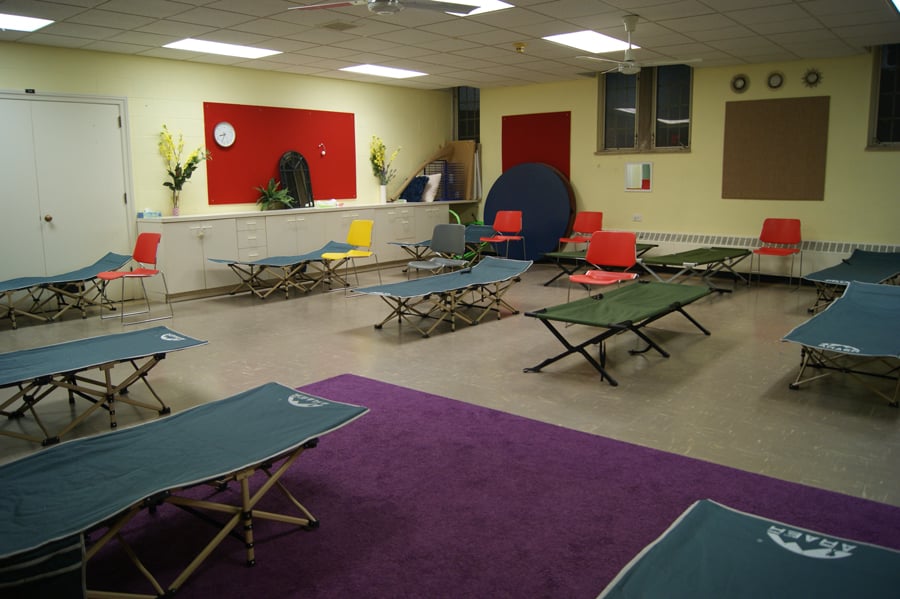Evanston organizations aid homeless during winter nights
Eva Herscowitz/The Daily Northwestern
The women’s space at the Interfaith Action emergency cold shelter. The shelter is open every night from mid-November through March for the first time since it opened.
January 14, 2020
For Evanstonians experiencing homelessness, the winter months are especially dangerous. At least 18 people in Cook County have suffered cold-related deaths since November, and homeless people risk frostbite and injury from the months of November to March, Interfaith Action director Sue Murphy said.
While the number of homeless people in Evanston is difficult to quantify, local nonprofit social service providers estimate that about 10 percent of Evanston’s population — roughly 7,500 people — are either homeless or at risk of becoming so.
Despite the fact that the city lacks a year-round shelter, some advocacy groups have filled the void. Often staffed by small teams of volunteers, these groups provide critical services to people experiencing homelessness during the winter months.
Interfaith Action of Evanston, a faith-based advocacy group, operates emergency cold shelters in six partnering faith communities: St. Paul’s Lutheran Church of Evanston, Unitarian Church of Evanston, First United Methodist Church, First Congregational Church of Evanston, First Presbyterian Church of Evanston and Beth Emet — The Free Synagogue.
Originally housed at St. Paul’s Lutheran and only open when temperatures fell below zero degrees, Interfaith Action’s cold shelter has progressively increased its temperature threshold over the last 15 years. This winter marks a major achievement for the group, Murphy said — it’s the first season the shelter has stayed open every night regardless of temperature, thanks to donations and increased volunteer participation.
Open from 9 p.m. to 6 a.m., the shelter stays running through volunteers, who provide each guest with hot beverages, a blanket and a sheet. Murphy was quick to add that services provided aren’t fancy.
“It kind of makes me laugh: people say this is such a wonderful shelter,” she said. “Honestly, it’s a skimpy blanket and a sheet, but it’s better than what they had without it. Sometimes we’re in a deeper basement and the hot water pipes run through, so it’s super hot. Other places, churches don’t heat during the night — that’s the rule — so they try to set their timers on their furnaces so we have heat all night, but sometimes it doesn’t work. It’s a work in progress. But at least people are out of the cold.”
In the men’s room, early guests flock to the outlets. People eligible for food stamps can receive an Illinois Link card and a free government assisted cell phone. Though the phone is stocked with few minutes, some homeless people use it to store addresses and music. For those out in the cold all day, charging it at night becomes a necessity.
Jennifer Kouba, associate director of development for Connections for the Homeless, said many of the people who utilize Connections’ services also frequent Interfaith Action’s emergency cold shelter. Connections also connects people experiencing homelessness to case managers, who can assist them in finding permanent housing. getting off the streets.
As a complex social issue, homelessness can be caused by lack of affordable housing or low-income work, physical and mental health problems, poverty, family or community breakdowns, substance use disorders and other economic and social factors. Kouba said serving Evanston’s homeless population doesn’t just shield them from the elements — it rebuilds trust with a community that has historically faced marginalization.
“A lot of the individuals that we serve have experienced a great deal of trauma and have had challenging dynamics with members of the community, whether that’s law enforcement or just not being welcome in different spaces,” Kouba said. “We certainly try to create an environment where everyone feels welcomed, safe and supported.”
Before the shelters operated every night, Murphy and Kirby said some homeless people would congregate in 24-hour restaurants or indoor parking lots, while others would remain in Evanston’s Public Library until it closed. With Evanston’s Burger King adjusting its hours to close at 3 a.m., options outside of the shelter have become even slimmer.
Rev. Michael Kirby, the senior pastor at Northminster Presbyterian Church of Evanston, serves on an Interfaith Action informal steering committee composed of representatives from host churches. Although Northminster doesn’t host the cold shelter, the church’s mission committee funds the shelters, and Northminster congregants frequently volunteer to set up the space, stay overnight or clean up, Kirby said.
Kirby said Interfaith Action’s long-term goal is to establish a permanent shelter. But without a functional space, this objective is “largely a dream.” The six hosting faith communities experience significant “wear and tear” on their buildings, he added.
“The reality is that this is very difficult for those six churches that host during the winter,” he said. “They all have been incredibly generous and willing to do it, but that’s not the permanent solution.”
Connections offers food, warm clothing and showers at its drop-in shelter and Hilda’s Place Transitional Shelter, a year-round overnight shelter that services up to 18 men. At Hilda’s Place, guests can meet with a medical staff to address mental and physical health needs.
First United Methodist Church partnered with Connections to create Daisy’s Place, a year-round transitional shelter for women, which will open sometime this year.
Kirby said it’s important to view the people who stay at Interfaith Action’s shelter as “guests.”
“We try not to force ourselves on them but to be open to seeing how they’re doing, talking to them, seeing how their day has gone, while at the same time helping set up, making sure they get coffee in the morning,” he said. “It’s basically just treating them the way you would want to be treated in a similar situation: trying to have hospitality and provide dignity to people.”
Email: [email protected]
Twitter: @herscowitz


